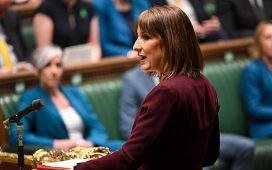House prices are continuing to spiral downwards, according to a survey from the leading membership body for estate agents.
The latest survey by the Royal Institution of Chartered Surveyors (Rics) found that buyer demand is declining, and that there are fewer homes coming to the market.
Alongside this, both sales transactions and house prices are falling as higher mortgage rates continue to impact the market.
The monthly survey takes the temperature of Rics’ estate agent members, and gives a snapshot of what is happening on the ground in the property market right now.

Rics survey: Indicators on demand, sales, instructions and prices all remain in negative territory, according to member estate agents
House prices remain on a downward trajectory at the national level, according to the survey. The September net balance of -69 per cent is virtually unchanged from last month.
The net balance refers to the proportion of surveyors and estate agents reporting a rise in prices, minus those reporting a fall, and can range from -100 to +100.
For example, if 79 per cent say prices have fallen and 10 per cent are saying prices have risen, this would result in a net balance of -69 per cent. Under this scenario, it would also mean that an the additional 11 per cent of those surveyed would have stated that prices were unchanged.
While almost all parts of the UK are seeing house prices fall at present, the downward pressure appears most significant across the West Midlands and the South East of England.
In these areas, surveyors and estate agents reported respective net balances of -94 per cent and -91 per cent, meaning almost all those surveyed were seeing prices falling.
However, although the latest net balance of -48 per cent is not quite as negative as the reading of -65 per cent returned last month. This means that 48 per cent more surveyors reported decreases, rather than increases, in prices over the last three months.
One major factor contributing to these house price falls is declining buyer demand, which will likely be largely down to higher mortgage rates.

Falling: House prices remain on a downward trajectory at the national level, according to the Rics survey
Tom Bill, head of UK residential research at Knight Frank said: ‘A sense of predictability is returning to the UK housing market, which means buyers and sellers can better come to terms with higher mortgage rates.
‘House prices will continue to come under pressure but we think most of the correction will happen this year as demand hardens.
‘The general election may limit housing market activity next year but modest single-digit annual growth should return from 2025.’
The latest net balance for new buyer enquiries came in at -39 per cent during September, according to those surveyed across the industry.
According to this same metric, agreed sales also remained in negative territory, with a net balance of -37 per cent among surveyors.
It’s worth pointing out that these figures were slightly less downcast than what respondents were reporting in August and July – though these months typically see less activity due to holidays.
Over the coming three months, respondents continue to foresee a decline in sales volumes. However, next year they expect to see volumes pick up again.
Alongside a lack of buyer demand, Rics members also noted that the volume of new listings coming onto the sales market was in decline.
New instructions have now reportedly fallen in each of the last three months, resulting in average stock levels on estate agent books holding broadly steady at 38 properties since July.
The feedback also continues to suggest that the number of market appraisals undertaken of late is below that of last year, meaning any immediate changes in supply levels available across the market seem unlikely.

Down: Each estate agent branch was making fewer than 15 sales in the past three months on average, according to the Rics survey
What about the rental market?
The disparity between the number of homes available to rent and the number of tenants needing a home is causing rental price rises, according to the Rics report.
In the lettings market, a net balance of +43 per cent of those surveyed said they saw an increase in tenant demand in September.
At the same time, the net balance of those reporting an increase in landlords offering up new properties to rent was -24 per cent.
Given this backdrop, rents are expected to be squeezed higher, with surveyors and agents predicting roughly 5 per cent average growth in rental prices across the UK over the next twelve months.
Tom Bill of Knight Frank added: ‘A proliferation of red tape and taxes for landlords has contributed to shrinking supply and fast-rising rents in recent years.
‘The situation has been exacerbated by higher mortgage costs for buy-to-let owners, the prospect of further regulation and demand from tenants who are unable to become first-time-buyers.
‘Measures designed to discourage landlords have had the unintended effect of causing financial pain for tenants.’
Some links in this article may be affiliate links. If you click on them we may earn a small commission. That helps us fund This Is Money, and keep it free to use. We do not write articles to promote products. We do not allow any commercial relationship to affect our editorial independence.










